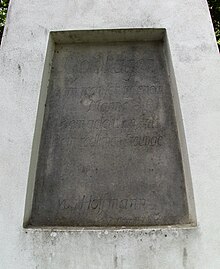Johann Friedrich Gottlieb Goldhagen
Johann Friedrich Gottlieb Goldhagen (born May 21, 1742 in Nordhausen ; † January 10, 1788 in Halle (Saale) ) was a German medic . Goldhagen was a professor of medicine and natural history at the University of Halle .
Life

Goldhagen was born the son of Johann Eustachius Goldhagen . His younger brother was Heinrich Philipp Goldhagen , who later became the Royal Prussian detective director . He first attended the grammar school in Nordhausen, which his father presided over as rector . In 1753 the family moved to Magdeburg because the father had now taken over the rectorate at the cathedral high school in Magdeburg. He finished his school education at the Francke Foundations in Halle, which his father had also attended.
In May 1760 Goldhagen began studying medicine at the University of Halle. His professors included Friedrich Christian Juncker , Philipp Adolph Böhmer and Johann Peter Eberhard . On May 9, 1765 exactly five years after his enrollment, received his doctorate he attended the Medical Faculty of the University of Halle with the dissertation Dubitationes De Quadam Causae Motus muscular Explicatione for Doctor of Medicine . Then he immediately began himself, as a private lecturer , to give lectures in medicine, but also in zoology and botany . With the offers in zoology and botany, Goldhagen was able to fill a gap that had arisen after Heinrich Christian Alberti left. One of his sponsors at the university was Andreas Elias Büchner , who recognized Goldhagen's scientific talent early on. The university honored his well-attended lectures in June 1769 with an extraordinary professorship at the medical faculty.
After the death of Andreas Elias Büchner in July 1769, Goldhagen received a full professorship for natural history at the Philosophical Faculty in November 1769 . It was explicitly created for him as an independent professorship. He was now lecturing at two faculties. On December 19, 1770, Goldhagen was granted citizenship in Halle . Two years later he was elected Halle City Physician and ran his own large medical practice in Halle. In addition, he was able to create an extensive natural collection , which later formed the basis for the zoological and mineralogical university collection. The accumulation of offices, as a university teacher at the same time to head the city health department, was criticized by some colleagues. The medical faculty initially refused him a full professorship in medicine, and it was only when the royal Prussian court in Berlin advocated Goldhagen that the faculty had to officially introduce him as a full professor in 1778.
In 1787 the responsible ministry in Berlin approved the establishment of a university clinic in Halle , the first director of which was Goldhagen. There Johann Christian Reil was one of his most important students and successors as director of the clinic. In order to be able to devote himself entirely to this task, he laid down the city physics in the same year. At the same time he was named the Royal Prussian Oberbergrat . However, Johann Friedrich Gottlieb Goldhagen died on January 10, 1788, at the age of 45, of typhus in Halle. Johann Christian Reil performed an autopsy and published the report that same year. Goldhagen was buried in Halle's Stadtgottesacker , his grave is in crypt arch 41.
From 1756 to 1764 Goldhagen was a member of the Philadelphia Masonic Lodge for the Three Golden Arms and later in its successor Lodge for the Three Swords in Halle. From 1778 to 1786 he was the master of the chair . For many years he was friends with the University Chancellor Carl Christoph von Hoffmann from Halle , who after his death erected an obelisk for him in the park of his estate in Dieskau . Hoffmann was also able to acquire Goldhagen's valuable natural history collection for the university.
Publications (selection)
- De tensione nervorum. 1764.
- Dubitationes De Quadam Causae Motus Muscularis Explicatione. ( Dissertation ), Halle 1765. ( digitized )
- De sympathia partium corporis humani. 1767.
- Introduction to folk medicine. 1789.
literature
- Wolfram Kaiser: Johann Friedrich Gottlieb Goldhagen (1742–1788) from Nordhausen, city physician and professor in Halle. In: Meyenburg-Museum (Hrsg.): Contributions to local history from the city and district of Nordhausen. Issue 2–3, Druckerei Progress, Nordhausen 1978, pages 58–70.
- Johann Christian Reil : The blessed Oberberg-Rath JFG Goldhagen disease history. Hall 1788, ( digitized )
- Goldhagen, (Johann Friedrich Gottlieb). In: Johann Georg Meusel : Lexicon of the German writers who died from 1750 to 1800. Volume 4, Gerhard Fleischer d. J., Leipzig 1804, page 83, ( digitized )
- Weak expression of stronger feelings on the coffin of our unforgettable teacher, Herr Oberbergrath Goldhagen. A speech given in the mourning house by a pupil Dietrich who loved him forever even in the ashes. Dost, hall 1788.
- Ralf Jacob : resting place of important personalities of the German intellectual and economic history. In: City of Halle (Saale), The Lord Mayor (Ed.): The Halle city godsack. Unique cemetery complex from the German Renaissance. Hall 2003, page 18, ( digitized )
Web links
- Works by and about Johann Friedrich Gottlieb Goldhagen in the German Digital Library
- Entry on Johann Friedrich Gottlieb Goldhagen in Kalliope
- Johann Friedrich Gottlieb Goldhagen in the German biography
- Entry on Johann Friedrich Gottlieb Goldhagen in the Catalogus Professorum Halensis
- Entry about Johann Friedrich Gottlieb Goldhagen in the digital portrait index
| personal data | |
|---|---|
| SURNAME | Goldhagen, Johann Friedrich Gottlieb |
| BRIEF DESCRIPTION | German physician and university professor |
| DATE OF BIRTH | May 21, 1742 |
| PLACE OF BIRTH | Nordhausen |
| DATE OF DEATH | January 10, 1788 |
| Place of death | Halle (Saale) |
